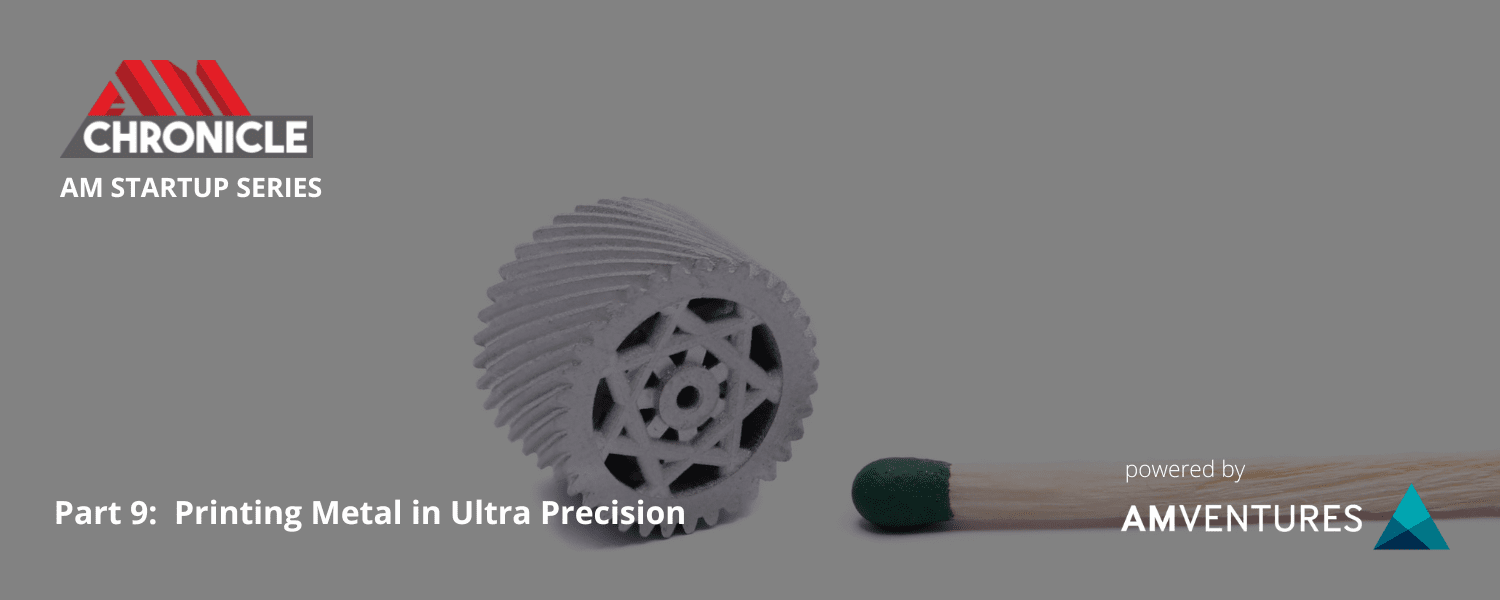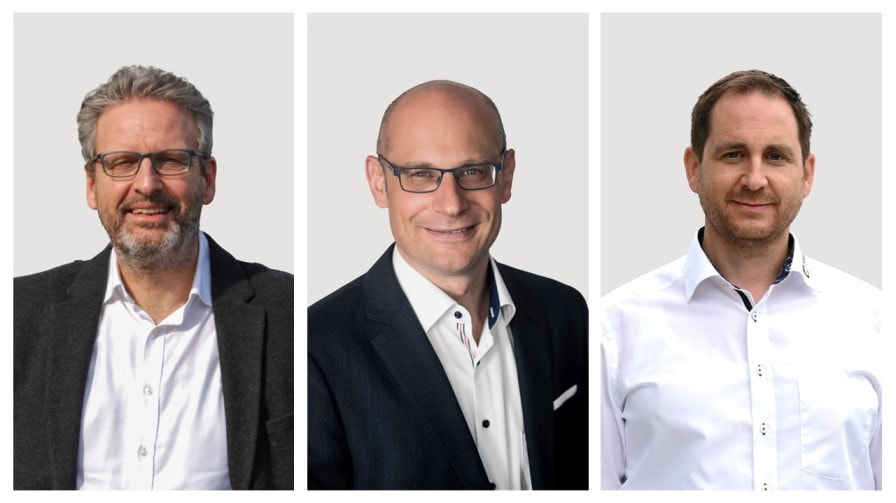MetShape GmbH is a start-up working in sinter-based additive manufacturing of small and micro metal parts. MetShape GmbH technology enables manufacturing with exceptionally good surfaces.
In a Nutshell
MetShape GmbH is a production service provider specializing in sinter-based additive manufacturing of small and micro metal parts. The company was spun off from Pforzheim University in April 2019. The idea to found the technology start-up arose during a research project in the context of which the Lithography-based Metal Manufacturing (LMM) technology was developed. This technology enables the manufacturing of high-precision metal components with exceptionally good surfaces.
As co-developer of the LMM-technology, MetShape has unique process know-how and by focusing especially on the sintering process became an expert in sintering. Consequently, the company also offers sintering services alongside the part production with the LMM-technology. Moreover, the developed sinter expertise leads MetShape to add further technologies to its portfolio.
Due to its unique know-how, MetShape offers high-quality, finished components that can be used for series applications compared to other 3D printing service providers that specialize in prototypes and single-part production.
Brains behind this
MetShape was formed by Dr. Andreas Baum, Prof. Dr. Carlo Burkhardt and Dr. Johannes Homa. Dr. Andreas Baum is the Managing Partner at MetShape, he has worked as a research associate in Additive Manufacturing at the University of Pforzheim. Prof. Dr. Carlo Burkhardt is the Consulting Partner at MetShape, he has years of experience in MIM and is a sintering and materials expert. Dr. Johannes Homa is also Consulting Partner at MetShape, he is a Serial Entrepreneur in AM and has a strong network in AM.
The Before and The After
A lot of additive manufacturing technologies face not only technological but especially economic challenges such as high initial costs that are inhibiting their broad industrial use. Additionally, other AM technologies struggle to economically manufacture small to medium annual quantities of small and micro metal parts due to a lack of accuracy and high post-processing costs.
Apart from the costs, the need for post-processing is generally often a reason that additive manufacturing is not considered a suitable alternative to traditional manufacturing technologies. MetShape is addressing this issue and pursues a completely different approach than its competitors as MetShape is able to manufacture ready-to-use parts that do not need any post-processing. This statement can be supported by the fact that 70% of the parts produced by MetShape can go directly into the application of the customer.
To achieve the production of high-quality ready-to-use parts, extensive know-how along the entire process chain is required. Especially the second production step of sinter-based additive manufacturing technologies which is represented by the de-binding and sintering is crucial for achieving extraordinarily good surfaces of the parts. MetShape has developed outstanding expertise in sintering and consequently also offers sinter services for companies using other sinter-based additive manufacturing technologies.
Technology:
MetShape focuses on additive manufacturing of small and micro precision parts. The used technologies enable economic production even for small and medium annual quantities and therefore fill a gap that could not previously be covered by either the MIM technology or other additive manufacturing processes. In comparison to tool-related manufacturing processes, the additive manufacturing is not connected to high initial costs enabling small quantities, high variability and flexibility of the respective parts spectrum.
MetShape has developed extensive expertise along the entire process chain and therefore can control each process parameter. Moreover, the company focuses especially on the sintering process enabling them to manufacture high precision finished parts with best surfaces making post-processing of the parts obsolete. As a sintering expert, MetShape also knows exactly how to deal with shrinkage during the thermal process and can deliver a precise as well as dimensionally accurate part and can guarantee tolerances up to ± 0.05mmto their customers. Additionally, the sintering know-how which is a crucial factor for all sinter-based additive manufacturing technologies leads MetShape to add other sinter-based additive manufacturing technologies to its portfolio offering its customers the highest flexibility in the development and production of their applications.
AM Ventures Asks
Along with technological innovations, it is important for start-ups to understand how their innovation is addressing the world’s biggest Environmental, Social and Governance Challenges. AM Ventures, our co-collaborator for this AM start-up series, poses a question to MetShape on their contribution to the world’s biggest ESG challenges.
The LMM-technology enables additive manufacturing of a range of components that could not previously be produced economically by any other AM-technology at all. Therefore, the company actively participates in the realization of innovations.
Currently, growing political tensions, import tariff considerations, and supply chains disrupted by the COVID-19 pandemic and international crises increase price and market vulnerabilities. MetShape obtains raw materials exclusively from the European Union and the manufacturing process is carried out entirely at MetShape in Germany. This results in low dependencies on foreign countries, high resistance to supply shocks and high transparency in the supply chain.
Additive manufacturing technologies in general have lower introduction costs and less material waste compared to common, industrial manufacturing methods. The technologies will surely increase output and input intensities in the upcoming decades, which will reduce the financial and especially ecological expenses, by shortening the supply chains and decreasing the production-related labor.
As MetShape uses sinter-based additive manufacturing with the LMM-technology a higher material efficiency compared to powder bed methods is possible. The recyclability of non-used dispersions is expected to be much higher than the recyclability of metal powders in binder-jet, SLM, DED or EBM based methods. Additionally, the LMM-technology does not need support structures during the fabrication process, which greatly reduces the generated material waste, compared to other 3D-printing applications.
Funding Facts
2019: Founding of MetShape GmbH and one-year start-up funding by the funding program ‘Young Innovators’ of the federal state of Baden-Württemberg
2020: Development phase: Preparation for high-volume production
2021: Investment by AMV: Seed investment
2022: Heading to Series A and Take off phase: Turning from a prototype to a series manufacturer
They seek:
Looking for new investors to present to them about the company and its vision for indirect AM. They are also open to new partnerships and the work on research and joint projects. Looking forward to new contacts and realising new applications for different industries such as the medical technology industry, the luxury sector or the Metal and Electronic branch.
Contact Details
Website: https://www.metshape.com/home.html
Schedule an appointment with expert Mike Schimmelpfennig:
https://www.metshape.com/contact.html
Email: [email protected]
A Quick Recap
- MetShape GmbH is a production service provider specializing in sinter-based additive manufacturing of small and micro metal parts.
- Spun off from Pforzheim University in April 2019.
- The idea to found the technology start-up arose during a research project in the context of which the Lithography-based Metal Manufacturing (LMM) technology was developed.
- This technology enables the manufacturing of high-precision metal components with exceptionally good surfaces.
- As co-developer of the LMM-technology, MetShape has unique process know-how and by focusing especially on the sintering process became an expert in sintering.
- The Company offers sintering services alongside the part production with the LMM-technology.
- The developed sinter expertise leads MetShape to add further technologies to its portfolio.
- Due to its unique know-how, MetShape offers high-quality, finished components that can be used for series applications compared to other 3D printing service providers that specialize in prototypes and single-part production.
- A lot of additive manufacturing technologies face not only technological but especially economic challenges such as high initial costs that are inhibiting their broad industrial use.
- AM technologies struggle to economically manufacture small to medium annual quantities of small and micro metal parts due to a lack of accuracy and high post-processing costs.
- Apart from the costs, the need for post-processing is generally often a reason that additive manufacturing is not considered a suitable alternative to traditional manufacturing technologies.
- MetShape manufactures ready-to-use parts that do not need any post-processing.
- 70% of the parts produced by MetShape can go directly into the application of the customer.
- To achieve the production of high-quality ready-to-use parts, extensive know-how along the entire process chain is required. Especially the second production step of sinter-based additive manufacturing technologies which is represented by the de-binding and sintering is crucial for achieving extraordinarily good surfaces of the parts.
- MetShape has developed outstanding expertise in sintering and consequently also offers sinter services for companies using other sinter-based additive manufacturing technologies.
- MetShape focuses on additive manufacturing of small and micro precision parts. The used technologies enable economic production even for small and medium annual quantities and therefore fill a gap that could not previously be covered by either the MIM technology or other additive manufacturing processes.
- In comparison to tool-related manufacturing processes, the additive manufacturing is not connected to high initial costs enabling small quantities, high variability and flexibility of the respective parts spectrum.
- Developed extensive expertise along the entire process chain and therefore can control each process parameter.
- Focuses especially on the sintering process enabling them to manufacture high precision finished parts with best surfaces making post-processing of the parts obsolete.
- As a sintering expert, MetShape also knows exactly how to deal with shrinkage during the thermal process and can deliver a precise as well as dimensionally accurate part and can guarantee tolerances up to ± 0.05mmto their customers.
- Additionally, the sintering know-how which is a crucial factor for all sinter-based additive manufacturing technologies leads MetShape to add other sinter-based additive manufacturing technologies to its portfolio offering its customers the highest flexibility in the development and production of their applications.
- The LMM-technology enables additive manufacturing of a range of components that could not previously be produced economically by any other AM-technology at all. The company actively participates in the realization of innovations.
- Currently, growing political tensions, import tariff considerations, and supply chains disrupted by the COVID-19 pandemic and international crises increase price and market vulnerabilities.
- MetShape obtains raw materials exclusively from the European Union and the manufacturing process is carried out entirely at MetShape in Germany. This results in low dependencies on foreign countries, high resistance to supply shocks and high transparency in the supply chain.
- Additive manufacturing technologies in general have lower introduction costs and less material waste compared to common, industrial manufacturing methods. The technologies will surely increase output and input intensities in the upcoming decades, which will reduce the financial and especially ecological expenses, by shortening the supply chains and decreasing the production-related labour.
- Higher material efficiency compared to powder bed methods is possible.
- Recyclability of non-used dispersions is expected to be much higher than the recyclability of metal powders in binder-jet, SLM, DED or EBM based methods.
- LMM-technology does not need support structures during the fabrication process, which greatly reduces the generated material waste, compared to other 3D-printing applications.
- Key milestones:
- In 2019: Founding of MetShape GmbH and one-year start-up funding by the funding program ‘Young Innovators’ of the federal state of Baden-Württemberg
- 2020: Development phase: Preparation for high-volume production
- 2021: Investment by AMV: Seed investment
- 2022: Heading to Series A and Take off phase: Turning from a prototype to a series manufacturer
- Seeking new investors to present to them about the company and its vision for indirect AM.
- Open to new partnerships and the work on research and joint projects.
- Looking forward to new contacts and realising new applications for different industries such as the medical technology industry, the luxury sector or the Metal and Electronic branch.
Disclaimer: This AM Chronicle Startup series is powered by AM Ventures and companies mentioned in the series are not necessarily funded or supported by AM Ventures directly, unless otherwise mentioned.
Subscribe to AM Chronicle Newsletter to stay connected: https://bit.ly/3fBZ1mP
Follow us on LinkedIn: https://bit.ly/3IjhrFq
Visit for more interesting content on additive manufacturing: https://amchronicle.com/





